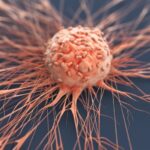The kidneys play a vital role in filtering blood, removing toxins, and regulating blood pressure. When kidney function declines, the body may exhibit early warning signs that many people may overlook. Notably, some symptoms that appear in the morning could be subtle indicators of underlying kidney issues.
Listed below are five unusual morning symptoms that may warrant your attention, as they could be directly related to declining kidney function:
1. Mild facial and eyelid swelling upon waking up
One early sign of kidney trouble is mild swelling in the face or eyelids in the morning. Many people attribute this to lack of sleep or sleeping in a certain position, but in reality, it could indicate underlying kidney problems.

When the kidneys are not functioning optimally, the body’s fluid balance is disrupted, leading to water retention in soft tissues, particularly the face. This swelling tends to be more noticeable in the morning and may shift to the lower limbs by evening. Swelling is commonly seen in conditions such as acute glomerulonephritis, chronic glomerulonephritis, IgA nephropathy, nephrotic syndrome, or complications of diabetes, lupus, etc.
If you frequently experience eyelid swelling upon waking up, it’s advisable to consult a healthcare professional for a kidney health check.
2. Ammonia breath
Another distinct sign of kidney issues is breath that smells like urine, or ammonia. This phenomenon typically occurs in the early morning due to reduced saliva production during sleep, allowing uremic metabolites in the blood to break down into ammonia, resulting in an unpleasant mouth odor.
Ammonia breath could indicate a late stage of chronic kidney disease, where the kidneys’ blood filtration function has significantly declined. If you notice an unusual mouth odor in the morning that is unrelated to digestive or dental issues, it’s imperative to seek medical advice to assess kidney function.
3. Dizziness and weak limbs
Feeling dizzy and weak in the limbs upon waking up, despite adequate sleep, could be a sign of complications associated with chronic kidney disease.

This condition is often a result of kidney-related anemia, high blood pressure, or uremic neuropathy. When toxins accumulate in the blood due to impaired kidney function, they can affect the central nervous system, leading to fatigue and weakness.
Unexplained morning fatigue should not be ignored, as it could be an early sign of progressing kidney disease.
4. Gum bleeding and nausea while brushing teeth
Some individuals may experience gum bleeding and nausea while brushing their teeth in the morning. If dental or gastric issues are ruled out, these symptoms could be indicative of kidney problems.
Declining kidney function can lead to blood coagulation disorders, making gum bleeding more likely. Additionally, elevated levels of toxins in the blood and saliva can irritate the digestive system, causing nausea or dry heaving in the morning.
If you have a history of diabetes, high blood pressure, or gout—all of which are risk factors for chronic kidney disease—these symptoms warrant extra attention and early medical consultation.
5. Clear urine like water
Typically, morning urine is darker in color due to the higher concentration of waste products accumulated overnight. However, if your morning urine is clear and resembles water, it could suggest that your kidneys are losing their ability to concentrate and filter urine.
Excessively dilute urine in the morning may indicate conditions such as renal tubular acidosis, chronic kidney disease, or renal tubular damage. When kidney function is severely compromised, the kidneys cannot retain essential substances, leading to frequent urination and abnormally dilute urine.
While this may be mistaken for “good hydration,” it is, in fact, a sign of declining kidney filtration capacity.
Morning symptoms like facial swelling, ammonia breath, fatigue, nausea, and clear urine should not be taken lightly. They could be early warning signs of underlying kidney dysfunction.
If you are experiencing one or more of these symptoms, it is advisable to consult a healthcare professional and undergo kidney function tests as soon as possible. Early detection and treatment are key to preventing kidney disease from progressing to a critical stage.


































